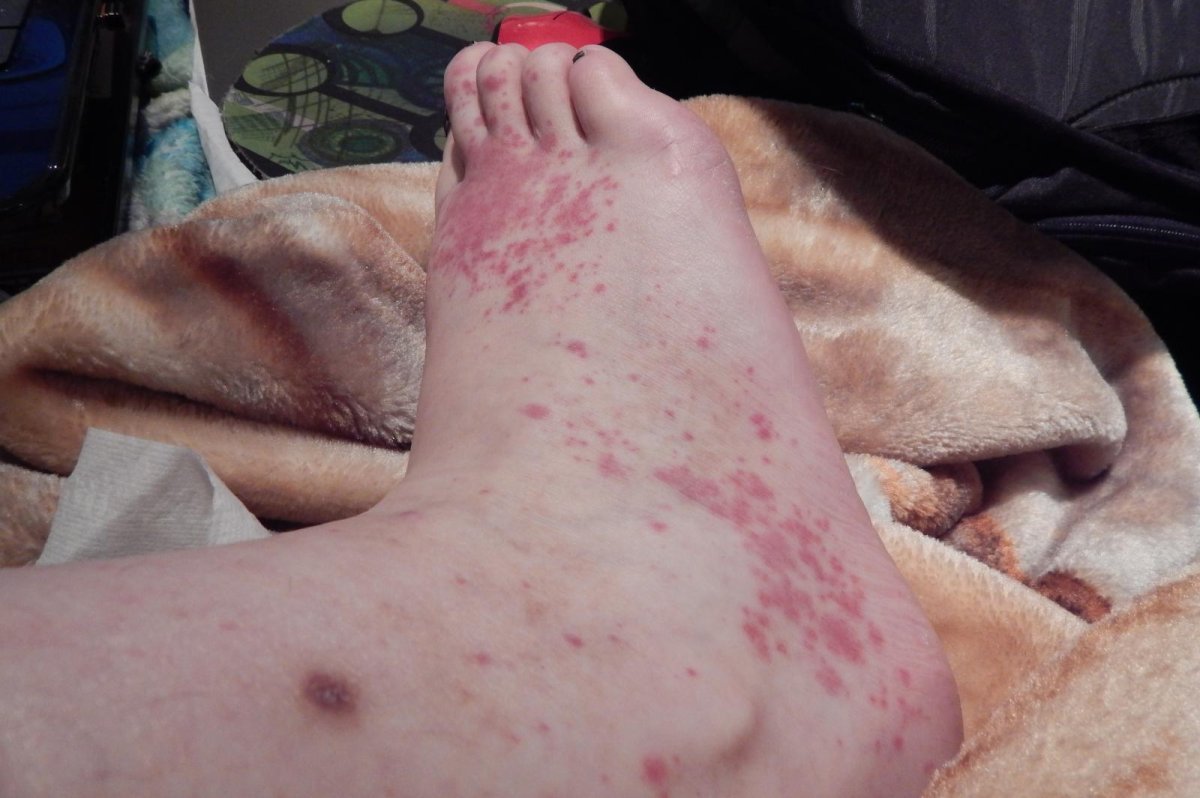1/2 | A new study from China shows that acupuncture may provide limited relief for patients with chronic hives.Photo credit: Verysmallkisses/Wikimedia Commons
NEW YORK, Nov. 13 (UPI) — Acupuncture may provide limited relief for patients with chronic hives, a new study from China shows.
Results of a randomized controlled trial of more than 300 people diagnosed with chronic spontaneous urticaria were published Monday in the Annals of Internal Medicine.
Chronic spontaneous urticaria – the most common form of chronic urticaria – is characterized by recurrent itching, skin lesions, or swelling that lasts for more than 6 weeks in the absence of a specific trigger.
More than 90% of patients with this condition require urgent treatment to relieve itching. Therefore, itch management is one of the main goals of treatment.
“Chronic spontaneous urticaria is a common skin disease that affects approximately 1% of the world’s population,” said study lead author Dr. Ying Li, a professor at Chengdu University of Traditional Chinese Medicine in Chengdu, Sichuan province, China. told UPI via email.
Persistent itching and the development of hives significantly reduce the patient’s quality of life. Doctors usually recommend antihistamines to relieve symptoms, but most patients don’t find them effective, even when the dose is increased two to four times, Lee said.
Second-line treatment for these patients comes in the form of Xolair (omalizumab), an expensive injectable prescription drug. However, the drug “is not reimbursed in many countries, and its use is limited to most patients worldwide,” Lee said.
“Given the shortcomings of existing treatments, new therapeutic interventions and strategies are emerging” for the itch associated with chronic urticaria, he said.
He added: “Acupuncture, a traditional physical therapy with a rich historical background dating back more than a thousand years, has been considered an effective treatment for urticaria in China.”
An editorial accompanying the study says the results are interesting because they provide a detailed look at the effectiveness of acupuncture for conditions not characterized by pain.
Although the clinical significance of the findings is not clear, clinicians should always be open to the possibility of using acupuncture as an adjunct to influence outcomes, even in more severe disease states, according to a news release. Should be accepted.
The editors note that acupuncture is often ignored as a treatment because it lacks commercial support compared to other modern interventions.
Dr. Mike Cummings, author of the editorial and medical director of the British Medical Acupuncture Society in London, told UPI in an email that this study shows that “acupuncture does not just affect inflammatory conditions throughout the body; This is important because it shows the possibility of providing Patient perception of symptoms. ”
Dr. Shyam Joshi, director of the Allergy and Immunology Clinic at Oregon Health & Science University in Portland, told UPI in a phone interview that this study is not the first to examine the effects of acupuncture on chronic hives. .
However, this is his first attempt to “investigate this issue in a robust way, in terms of having a treatment group and a sham group.” An effective sham treatment pretends to provide as active an intervention as possible (in this case acupuncture) without having any therapeutic effect.
“Compared to all previous studies, this was a really well-conceived study,” Professor Joshi said, noting that participants in the acupuncture group had less itching, depression and anxiety compared to the sham group. He noted that he showed some improvement. They received either acupuncture or sham treatment 16 times over four weeks.
“Some patients cannot tolerate the typical interventions we currently have, so learning more about alternative options is always helpful in helping patients in the long run.” he said.
However, the results need to be further investigated in additional studies before doctors change their practices. Additionally, the study was limited to Chinese patients, so the results may not be generalizable to Americans.
Dr. Nancy Wasserbauer Kingston, senior attending physician in allergy and immunology at University Hospitals of Cleveland, told UPI in an email: Good explanation as to why.
“This condition is extremely frustrating for patients and their physicians.”
“Our immune system wants to maintain a healthy balance,” he said, adding, “The idea that acupuncture could help restore immune balance is valid.” “But ultimately, the suggestion that acupuncture reduces symptoms… [itching] Whether it is mediated through specific receptors in the nervous system remains a matter of debate. ”
While this short study highlights the potential for acupuncture to help relieve bothersome symptoms, “it doesn’t address the ultimate question of why the immune system is activated,” Kingston said. .
Still, “for highly motivated patients who have the access and means to pursue such treatments, acupuncture may provide some relief from the itch.”


